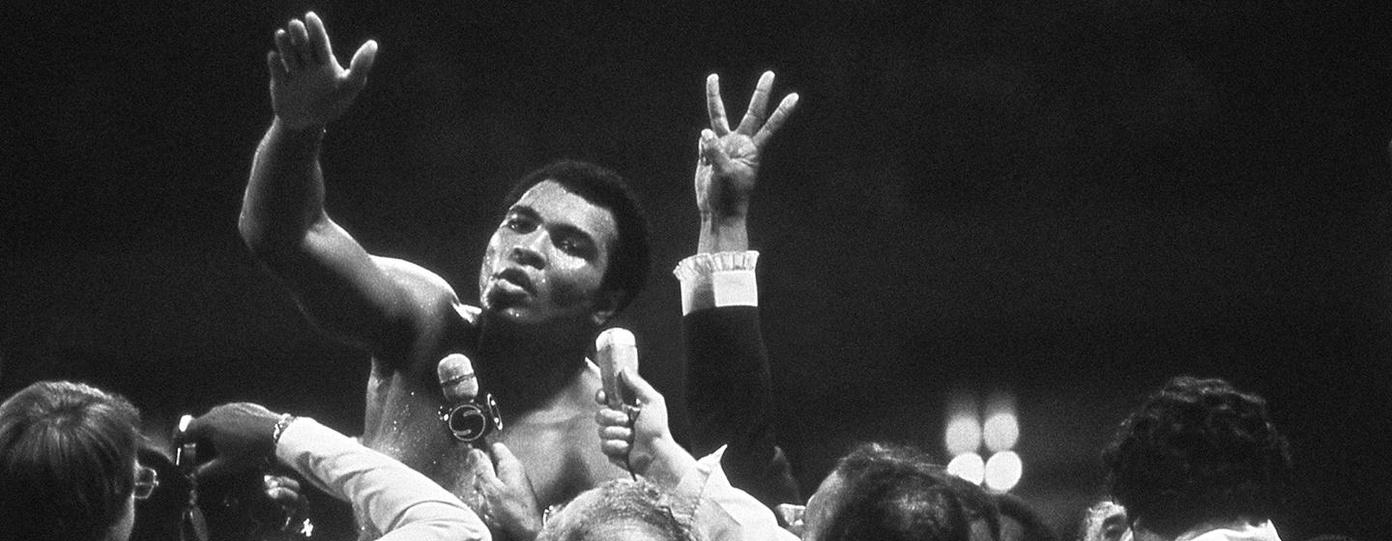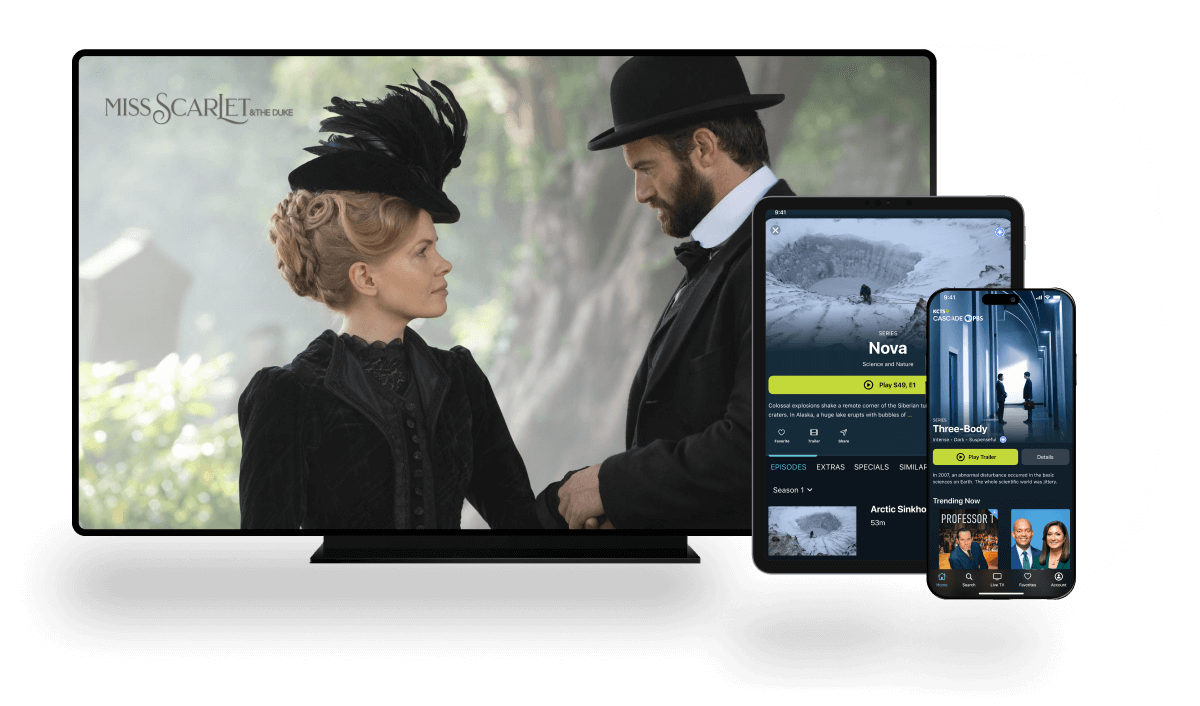
Q&A with Muhammad Ali filmmakers Sarah Burns & David McMahon
Muhammad Ali brings to life one of the most indelible figures of the 20th century. The Ken Burns production captures one of the most indelible figures of the 20th century, a three-time heavyweight boxing champion who captivated millions of fans throughout the world with his mesmerizing combination of speed, grace and power in the ring, and charm and playful boasting outside of it. Before getting to know Ali on the four-part series, learn more about the filmmakers’ inspiration. PBS conducted a Q&A with Sarah Burns and David McMahon to discuss bringing the series to life.
This interview has been edited and condensed.
What drew you to Muhammad Ali as a subject matter?
David McMahon: About seven years ago, a friend of ours was working on a big biography of Muhammad Ali, and he kept saying, "I know there's a lot out there on Muhammad, but it's generally focused on a single chapter, or one fight. There's nothing that stitches it all together. And I think you guys should tell the whole story.” We wanted to offer some new perspectives and there are voices in the series who I think will give viewers a deeper understanding of who Muhammed Ali was. For example, Sherman Jackson, who's a professor of Islamic studies at USC, really brings to life Muhammad Ali’s spiritual journey.
Sarah Burns: I'm sorry we didn't get a chance to meet Ali. These last few years of us working on the film, getting to know him, have been so inspiring. To me, the most compelling thing about him is that idea that he didn’t have to be a boxer — he could have done anything, and I think he still would have been this hugely important person, because of his charisma and because of the love he shared. He made just about everyone he ever encountered feel special and feel seen. And I think that's maybe his greatest gift — that ability to relate to people and to engage with them in this way that left an indelible impression.
Does telling the history of a more contemporary figure impact your process in any way?
David McMahon: I don't know that there's a more well-documented figure from the 20th century than Muhammad Ali. We interviewed over 40 people, many of whom knew him or covered him. We gathered 15,000 photographs and many dozens of hours of footage, many of him giving interviews. And he’s so good on camera. His promoters would say, "He's doing our job better than we could." There was so much to work with.
Sarah Burns: The great thing about our longer timelines is that it allows our team to find incredible archival material. There are periods where he’s covered in the paper every single day and there’s a photographer trailing him around everywhere he goes. I think we could have made this film all over again with different images and it would have been nearly as good. So, it was both easy in that sense and also a huge challenge, because of the volume of visual material. It was really an abundance of riches.
What is something important you think viewers will be able to learn about Ali’s relationship to his religion?
David McMahon: I think viewers will learn a lot about the extent to which his faith informs his life and guides him in so many of the important decisions he makes personally and professionally. He discovers the Nation of Islam at critical moment as he is trying to make sense of the segregated world around him. He is just a kid and he’s drawn to its message of self-pride and dignity and to the community. Though his relationship to his faith evolves over time, it remains central to his identity throughout his life.
Do you think he had any regrets?
Sarah Burns: We addressed this towards the end of the film when Ali himself acknowledges his failings. He recognized that he had not always treated the women in his life well. He wrote that he regretted having turned his back on Malcolm X. And he apologized to Joe Frazier for the way that he had treated him, though I don’t think Joe Frazier ever forgave him. But I think it’s meaningful that he recognized these areas where he had done harm to other people.
What does using the music of the time mean to you as a filmmaker?
David McMahon: What a rich period. We cover a span of music from his birth in the early ‘40s up to the present. We were eager to use popular music to anchor our viewers in time, but also draw out the emotion of the moment. So we have Bo Diddley, we have Duke Ellington, we have Miles Davis, we have Jimi Hendrix, we have The Rolling Stones, we have Stevie Wonder — it's a great score. We also use music that's out of time, more so than we usually do, but I think that it's effective because it mirrors Muhammad’s energy. He was so revolutionary, in his boxing style and in his life, that the music of the moment couldn’t always match his energy.
What family members were interviewed?
Sarah Burns: There are two daughters who appear in the film: Hana and Rasheda. And they both do a beautiful job of explaining Ali, not just as a father, but who he was as a person, as a human. We also interviewed two of his ex-wives, Khalilah Ali and Veronica Porche, and his brother Rahman, who was really his closest friend and by his side for so much of his life. They all help us understand Ali better, including some of his faults.
If the film looks at his life chronologically, does it refer to him as Cassius Clay up until he changed his name to Muhammad Ali?
David McMahon: Yes. The name change is a major plot point. And so, we used Cassius in our film right up until he's given that name when he goes public as a member of the Nation of Islam. He's given the name Muhammad Ali by The Honorable Elijah Muhammad, who's the leader of the Nation of Islam. From there he is always Muhammad Ali, but we also address the fact that many reporters and members of the public still refused to call him by his new name. And there's a certain tension around that, but he insists that, as he always does, that he's free to be who he wants to be, and you're going to call him what he says his name is. So, that's an important consideration and I think there'll be clarity for viewers about when the name changes and then you go with Muhammad Ali from that point.
Does the film address how he got into boxing?
Sarah Burns: Yes. It’s the famous story of how a young Cassius Clay discovered boxing at 12 years old after having his bicycle stolen outside an auditorium. He finds a police officer, and it turns out that this police officer is running a boxing gym and Cassius Clay says, "I'm going to kill him, I'm going to fight him, whoever stole my bike." And the police officer says, "Do you know how to fight?" And that's how he begins his boxing. It sounds like an apocryphal story, like the mythology that we would normally discover is not true and then tell the real version, but it actually turns out it's true this time. That's really what happened. And so, there's a wonderful moment in the film when he steps into this boxing gym for the first time and just is mesmerized. And he sees it as a path for himself immediately. He knows exactly what he's going to do with his life.
America's relationship with Cassius Clay, and then Muhammad Ali, was complicated. He was hated by some, and then he became a beloved individual. So who changed? Muhammad Ali or America?
David McMahon: I think it was a mix. Ali grew as a boxer, and as an individual, throughout his career. He evolved, and so did America. But he stayed true to his principles, no matter the pressure. He was against the war for religious reasons. He didn't believe he should fight and he believed he could call himself whatever he wanted to and people needed to respect that. I think that by succeeding so brilliantly in the ring across two decades he was able keep the megaphone in his hands and could say what he wanted to and take the public positions that he felt he needed to. He did not believe that it made sense for the U.S. Army to be in Vietnam fighting a war against poor brown people. It was not a popular stance to take when he took it, but in retrospect people came to realize that it was the right stance. I think whatever he did, win, lose, whatever position he took, people discovered that he had the courage of his convictions.
What is something you want others to take away from this movie that will serve as the model that he was to others?
Sarah Burns: Muhammad Ali insisted that he be free to be whoever he wished to be no matter the cost. Anyone, anywhere who feels oppressed for their beliefs can find inspiration in his actions. He was kind and generous and cared about everyone. He touched everyone he met and left them with an indelible memory.
Muhammad Ali premieres Sunday, September 19, at 8:00 p.m. We’re hosting an event on September 23, inspired by Muhammad Ali, exploring the intersection of athletics, activism and art in our region. Check out KCTS9.org/Events to learn more or get tickets.








